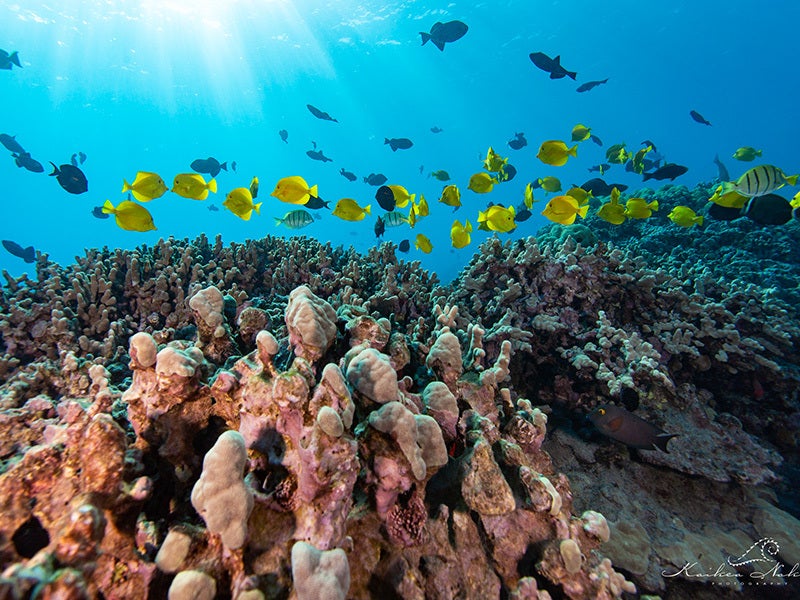Hawai‘i Land Board Says No to Aquarium Pet Trade
Victory
—Milestone decision protects West Hawai‘i reefs, rebukes industry
Contact
The State of Hawai‘i Board of Land and Natural Resources (BLNR) has unanimously rejected an environmental impact statement aimed at reopening the aquarium pet trade in West Hawai‘i Island. The Board’s decision last Friday effectively keeps intact a moratorium on commercial aquarium collection along the Kona Coast. The decision vindicated reef advocates, many of whom have been urging state scrutiny of the trade for decades.
“This is a huge win for me and my family, and for our way of life,” said Miloli‘i fisherman Wilfred “Willie” Kaupiko, who has been fighting for over 30 years to protect West Hawai‘i reefs from the damaging effects of the aquarium trade. “I see hope for the next generation, and I know that they will continue to carry on what I have fought to protect all these years.”
The Board’s decision is a major milestone in a legal battle that started in 2012, when Kaupiko and his son Ka‘imi joined forces with Rene Umberger, Mike Nakachi, the Center for Biological Diversity, and others to challenge the state’s failure to examine the aquarium pet trade’s impacts to ocean health. Represented by Earthjustice, the group secured a decisive win in 2017 when the Hawai‘i Supreme Court ruled that the state had to do an environmental review before issuing commercial aquarium permits.
For the last three years, a Virginia-based pet trade association has orchestrated preparation of the environmental review documents required by the Hawai‘i Environmental Policy Act.
“The industry’s environmental impact statement was built upon bad methods and bad data that conveniently skewed the analysis in its favor,” said Earthjustice attorney Mahesh Cleveland. “The law demands that the environmental review process fully and publicly examine the effects of a proposed action, rather than simply justify and rationalize a predetermined outcome. Fortunately, the Board asked the right questions, listened to what the public had to say, and correctly applied the law to the decision before it.”
The Board concluded that the impact statement failed to paint a true picture of the environmental harms of commercial aquarium collection. Board members noted a troubling lack of information about the ecological effects of removing fish in mass quantities from an already fragile reef ecosystem, and a failure to seriously consider the cultural impacts of the trade, among other flaws.
For decades, commercial aquarium collectors in Hawai‘i routinely extracted hundreds of thousands of endemic and indigenous Hawaiian reef fish a year, packaging the live fish in plastic bags and exporting them via air freight to aquarium hobbyists across the country. Although the Board’s decision effectively extends the moratorium on aquarium collection in West Hawai‘i, the state has continued to allow the industry to extract an unlimited number of fish annually in East Hawai‘i and elsewhere throughout the state. This ongoing illegal collection has prompted reef advocates, represented by Earthjustice, to file a parallel lawsuit, which is scheduled for a hearing before the state Environmental Court on June 24.
“BLNR recognized that the industry used faulty data and failed to consider cumulative impacts to the environment, including how the effects of climate change interact with the severe losses of herbivore abundance to this wildlife trade,” said Rene Umberger, Executive Director of For the Fishes, a reef wildlife advocacy group.
“Hawai‘i’s coral reefs are already in crisis,” said Maxx Phillips, Hawai‘i Director of the Center for Biological Diversity. “In rejecting the industry’s analysis, the Board acknowledged the negative impacts of commercial aquarium collection and drew a line in the sand for future permit applicants. This is a huge win for our coral reefs and the essential biodiversity they support.”
“The Board’s decision is a blessing for our family and for our West Hawai‘i community. Today, Hawai‘i is taking a stand for our natural resources and saying enough is enough,” said Miloli‘i fisherman Ka‘imi Kaupiko.
“There is only one Hawai‘i. We humans have done so much to harm and misuse this home we are blessed with. I’m grateful to the Board for doing the right thing and unanimously rejecting the environmental impact statement, but we’re not pau. We need to do more to mālama ‘āina, we need to make things momona [abundant] again,” said Mike Nakachi, a Native Hawaiian cultural practitioner from Kailua-Kona.

Additional Resources
About Earthjustice
Earthjustice is the premier nonprofit environmental law organization. We wield the power of law and the strength of partnership to protect people's health, to preserve magnificent places and wildlife, to advance clean energy, and to combat climate change. We are here because the earth needs a good lawyer.